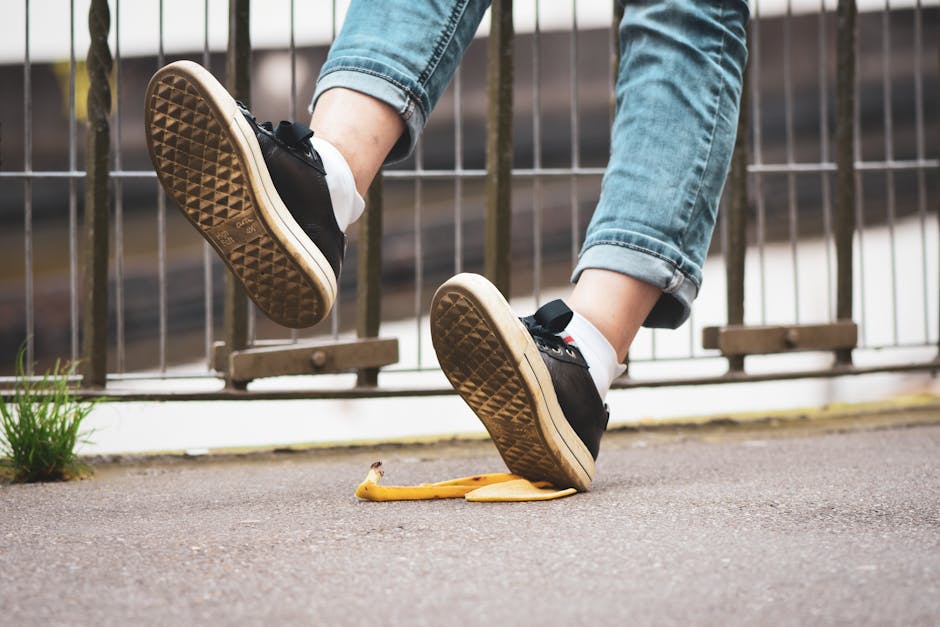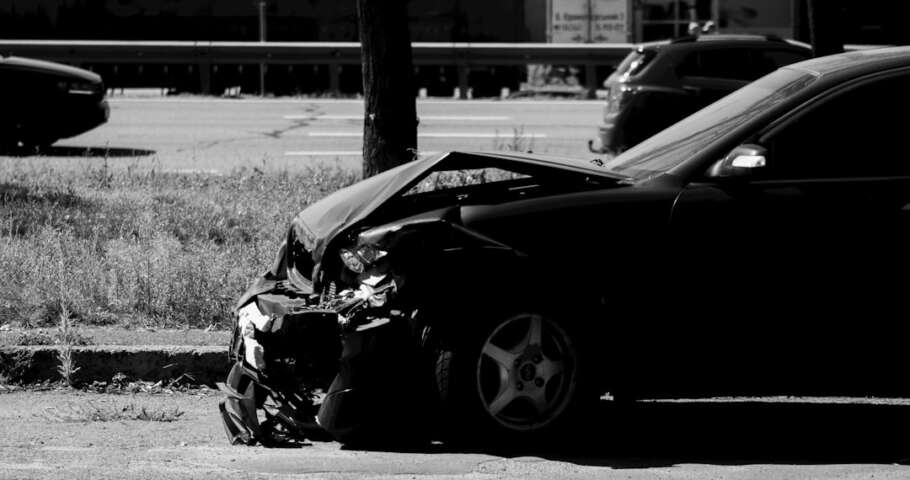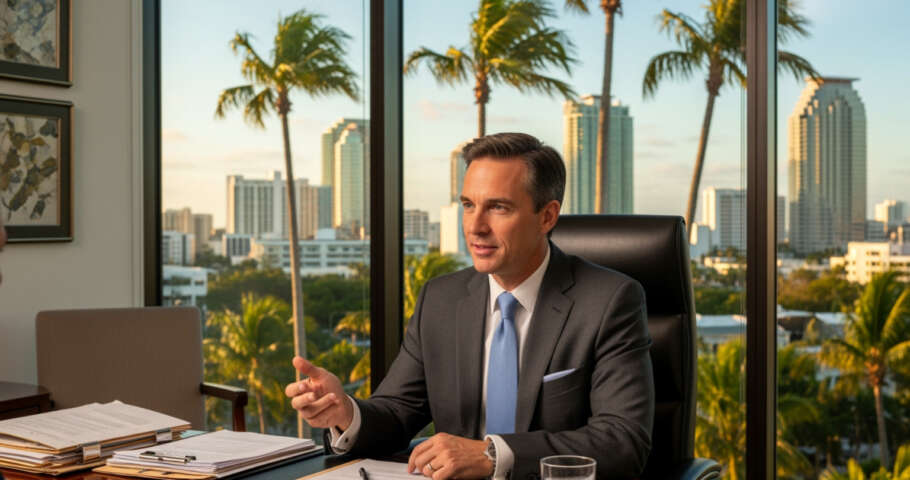Why Slip and Fall Insurance Matters More Than You Think
A wet floor, a loose tile, one misstep a0 a0thats all it takes for a routine visit to end in a costly accident. In fact, more than 42,000 Canadians and thousands of Floridians are hurt in slip and fall incidents every year, with the average claim topping $20,000 and severe cases soaring into six figures.
That price tag can bankrupt an unprepared homeowner or small business in Fort Lauderdale just as quickly as it can drain the savings of an injured visitor in Wilton Manors. Thats why understanding slip and fall insurance (the liability coverage hidden inside your home, renters, or commercial policy) is so critical.
If youre new to the topic, think of it as the piece of your policy that pays when someone else gets hurt on your propertycovering medical bills, lost wages, and your legal defence. Its a cornerstone of what lawyers call premises liability and it applies to virtually every property owner or occupier in South Florida.
For a quick primer on the broader issue, see this overview from Slip and fall law.
At DiStefano Law LLC, weve spent four decades helping clients untangle these claims. What follows is a concise guide to whats covered, what isnt, how to prevent accidents, and what to do if youre hurt.
What is “Slip and Fall Insurance” and Who Needs It?
Here’s something that might surprise you: slip and fall insurance isn’t actually a policy you can walk into an insurance office and buy. It’s more like an umbrella term for the liability coverage that’s already hiding in your existing insurance policies.
Think of it this way – when someone takes a tumble on your property and gets hurt, your insurance company doesn’t want to leave you hanging any more than you want to be left hanging. That’s where liability coverage comes in, and it’s probably already part of your homeowner’s, renter’s, or business insurance.
This coverage falls under something called premises liability – basically, the legal responsibility you have to keep your property reasonably safe for visitors. Now, you’re not expected to bubble-wrap every corner of your home or business. But if there’s a hazard you knew about (or really should have known about) and someone gets injured because of it, you could be on the hook financially.
The magic word here is negligence. Property owners aren’t automatically responsible every time someone trips over their own shoelaces. However, when you fail to maintain safe conditions or don’t warn people about known dangers, the law says you might need to pay for the consequences.
More info about Premises Liability

For Property Owners and Renters
Whether you’re a proud homeowner, a business owner trying to make it work, or someone renting their first apartment, understanding your liability coverage is crucial. Let’s break down what each group needs to know.
Homeowners usually have liability coverage built right into their homeowner’s insurance policy. This coverage acts like a financial safety net if someone gets injured on your property and you’re found to be at fault. Most standard policies provide between $1 million to $2 million in liability coverage, which includes both medical payments coverage (immediate medical expenses, no questions asked) and broader liability protection for more serious claims.
Renters need their own renter’s insurance policy with liability coverage. Here’s a common misconception: your landlord’s insurance covers the building, but it doesn’t protect you from liability if someone gets hurt in your rented space due to your negligence. That’s all on you, which is why renter’s insurance is so important.
Business owners need commercial general liability insurance, and slip and fall coverage is often one of the biggest reasons why. This type of policy covers accidents that happen on business premises, and it’s typically one of the first insurance policies smart business owners purchase. The good news? Average monthly premiums are around $42 for small businesses.
What is covered in a standard property insurance policy
Typical coverage limits vary depending on your policy and needs. Most homeowner’s policies start with $1 million in liability coverage, while business policies can range from $1 million to $2 million or higher. The real question isn’t just what you have, but whether your limits are adequate for your specific situation.
Understanding your policy details now – before you need them – can save you from some very expensive surprises later.
A Deep Dive into Coverage: What’s Included and What’s Excluded
When it comes to slip and fall insurance, the devil is truly in the details. Think of your liability coverage as a safety net – but like any net, it has holes. Understanding exactly what’s covered and what isn’t can save you from unpleasant surprises when you need protection most.
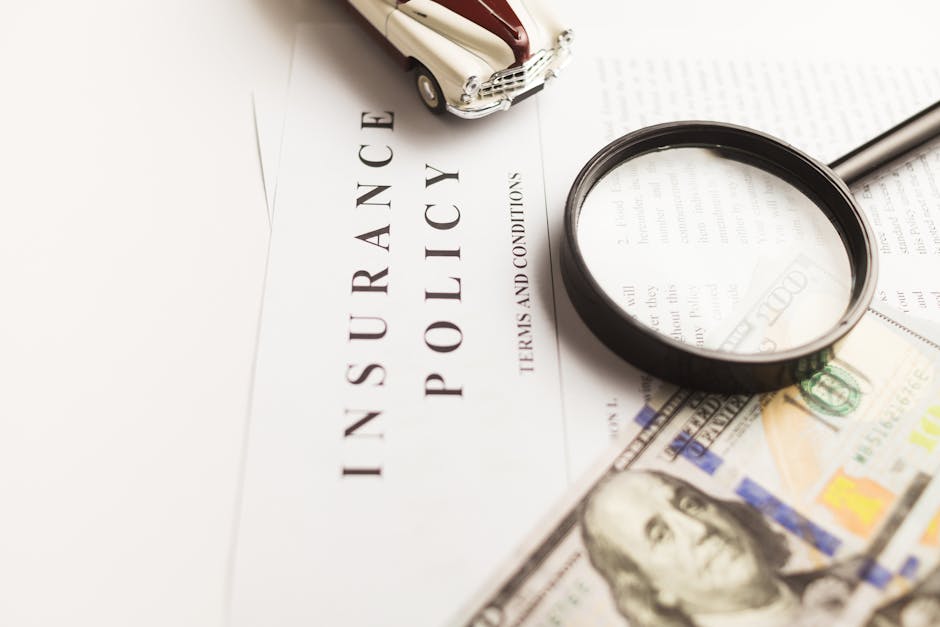
Your liability coverage works by providing financial protection when you’re legally responsible for someone else’s injuries. Every policy comes with specific limits – that’s the maximum your insurance will pay per incident. You’ll also have a deductible, which is your out-of-pocket cost before coverage kicks in. The claims process itself follows a structured path, starting the moment an accident is reported.
What Slip and Fall Insurance Typically Covers
When someone gets hurt on your property and you’re found at fault, your insurance becomes their financial lifeline. Here’s what typically gets covered:
Medical expenses form the backbone of most claims. Your insurance will pay for the injured person’s emergency room visits, ambulance rides, doctor appointments, and specialist consultations. Physical therapy sessions, prescription medications, and medical equipment like crutches or wheelchairs are also covered. Basically, if it’s medically necessary because of the accident, your insurance will likely handle it.
Lost wages represent another major component. When someone can’t work because of their injuries, your insurance compensates them for missed paychecks. This includes regular salary, benefits, bonuses, and even future earning capacity if the injury affects their long-term ability to work.
Legal fees and court costs can add up quickly, but your insurance has your back. Attorney fees for your defense, court filing costs, expert witness fees, and deposition expenses are all covered. Even if the case goes to trial, your insurance handles these mounting legal bills.
Settlements and judgments are where the big numbers come in. Whether you settle out of court or a judge awards damages, your insurance pays up to your policy limits. This includes any appeal costs if the case continues beyond the initial judgment.
Pain and suffering damages cover the human cost of an accident. This includes compensation for physical pain, emotional distress, loss of enjoyment of life, and permanent disability. It’s often the largest component of serious injury claims.
More info on Slip and Fall Compensation
Common Exclusions: What’s Generally Not Covered
Now for the reality check – your slip and fall insurance doesn’t cover everything. These common exclusions can leave you exposed:
Employee injuries fall under workers’ compensation, not your general liability coverage. If your employee slips on a wet floor at your business, that’s a workers’ comp claim. Most states require businesses with employees to carry separate workers’ compensation insurance for exactly this reason.
Your own injuries aren’t covered by your liability insurance. If you trip on your own front steps, you’ll need to rely on your health insurance or personal injury protection coverage. Liability insurance only protects you from claims by others.
Intentional acts void your coverage entirely. Insurance companies won’t pay if you deliberately hurt someone. The coverage only applies to accidents and negligent acts, not intentional harm.
Damage to your own property typically isn’t covered under liability insurance. If someone falls through your glass door during an accident, you’ll need property insurance to fix that door. Liability coverage focuses on the injured person’s damages, not yours.
Injuries from criminal acts create a gray area where coverage may not apply. If someone gets hurt during a crime on your property, your insurance company will carefully review the circumstances before deciding whether to provide coverage.
The High Cost of a Claim
The financial reality of slip and fall accidents can be sobering. While the average claim costs around $20,000, this figure tells only part of the story. The actual cost depends entirely on the severity of the injury.
Minor injuries like sprains and bruises might cost $10,000 to $50,000. Moderate injuries involving broken bones or concussions can reach $50,000 to $250,000. Severe injuries like spinal cord damage or traumatic brain injury can easily exceed $250,000, sometimes reaching $1 million or more.
Beyond the injury itself, you might face additional costs. A lawsuit involving reputational damage can cost around $50,000. If you’re found liable for an amount exceeding your insurance limits, you become personally responsible for the difference.
Being underinsured or uninsured can have devastating consequences. Without adequate coverage, you might have to liquidate assets, take out loans, or even face bankruptcy. In severe cases, personal liability can reach $1 million or more – a sum that could wipe out a lifetime of savings.
For Property Owners: Preventing Accidents and Managing Liability
The best claim is the one that never happens. A few low-cost safety steps can spare you huge legal headaches and keep visitors safe across our offices in Fort Lauderdale, Lauderhill, Sunrise, and beyond.

Top Hazards We See in Florida Cases
- Wet or newly-mopped floors without signs
- Uneven pavement, loose tiles, or potholes
- Dim lighting in hallways and parking lots
- Clutter, extension cords, or boxes in walkways
- Broken handrails and irregular stair heights
- Weather-related pooling water during heavy rain
A 6-Point Prevention Checklist
- Inspect daily log what you find and fix recurring issues fast.
- Clean spills immediately and post a visible “Wet Floor” sign until dry.
- Light it up replace burnt bulbs right away and add motion lights outdoors.
- Secure mats & rugs with non-slip backing; replace curled edges.
- Repair surfaces patch cracks, paint elevation changes, tighten handrails.
- Document everything photos, invoices, and a maintenance journal are gold in court.
Your Legal Duty in Florida (Quick Version)
- Invitees (customers) highest duty; you must inspect and warn.
- Licensees (social guests) warn of known dangers.
- Trespassers avoid willful harm.
Floridas comparative negligence rule means a visitor can still collect damages even if they were partly at faultthe payout just shrinks by their percentage of blame. Solid documentation of your prevention efforts is the best defence if youre sued.
More info on Florida Premises Liability Attorney
For the Injured: Steps to Take After a Slip and Fall
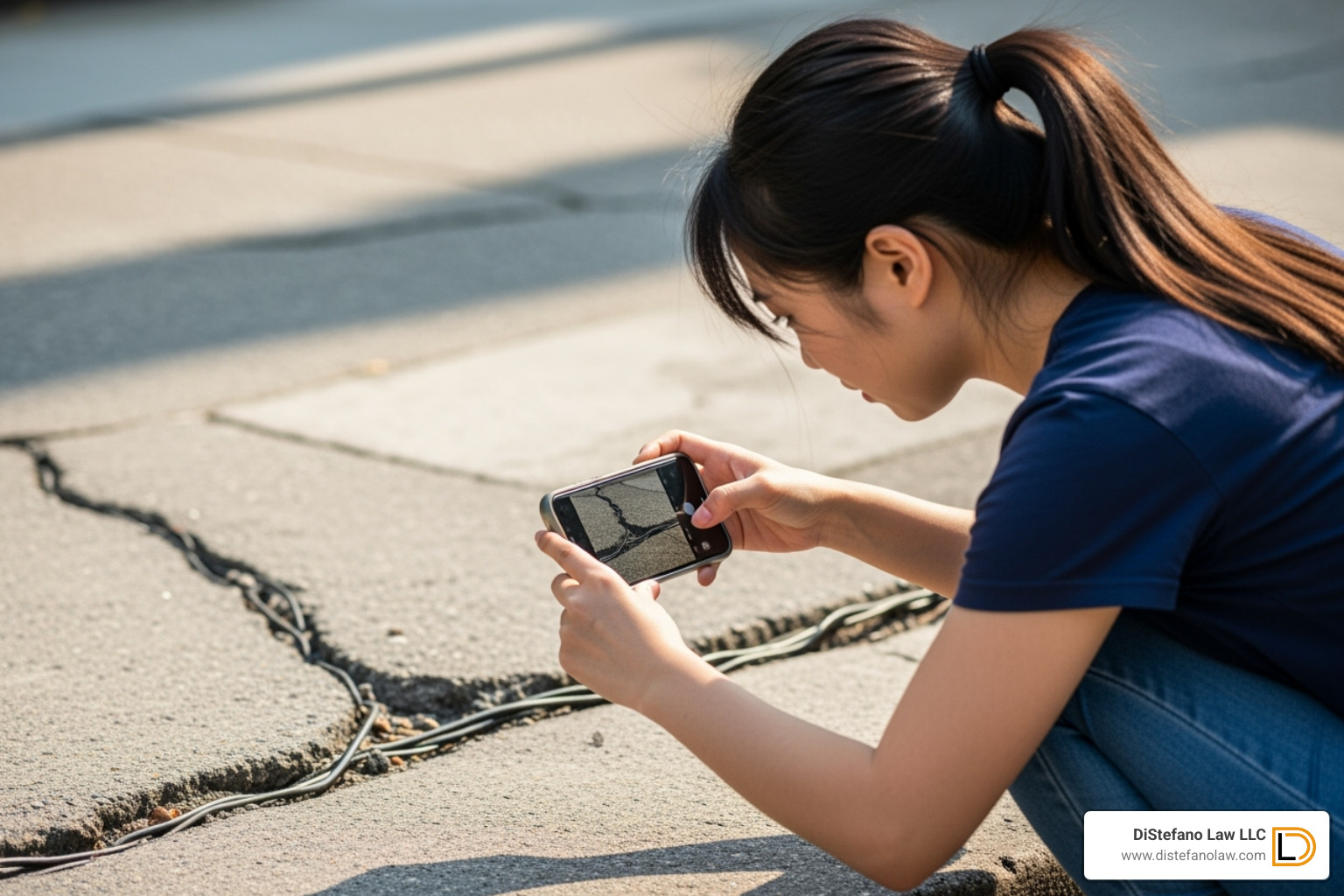
5 Moves That Protect Your Case
- Get medical help now. Some injuries appear hours later; a prompt exam links the fall to your condition.
- Report the accident. Tell the owner or manager and insist on an incident report; ask for a copy.
- Gather evidence. Use your phone for photos/video of the hazard, area lighting, weather, and your injuries. Save shoes and clothes.
- Collect witnesses. Names, emails, and phone numbers of anyone who saw the fall or hazard.
- Track every expense. Medical bills, mileage, lost pay, home-care costskeep receipts.
Key Deadlines in Florida
- Municipal or state property: written notice usually within 10 days.
- Private property: notice often required within 60 days.
- Lawsuit (statute of limitations): 2 years from the accident date.
Miss a notice deadline and even a strong case can vanish.
When to Call an Attorney
Contact DiStefano Law LLC if:
- You suffered fractures, head, spine, or surgery-level injuries.
- The owner or insurer blames you or denies fault.
- An adjuster wants a quick recorded statement or low settlement.
Serious injuries deserve serious representation. We handle the paperwork and negotiations so you can focus on recovery.
Frequently Asked Questions about Slip and Fall Insurance
Whats a realistic settlement range?
- Minor injuries: $10k$50k
- Moderate (e.g., fractures): $50k$250k
- Severe (brain/spine): $250k$1M+
Severity, medical bills, lost income, strength of evidence, and policy limits all drive value. There is no onesizefitsall “average.”
How do you prove negligence?
- Duty of care owner owed you safety.
- Breach hazard existed and wasnt corrected or warned about.
- Causation breach caused your fall.
- Damages medical bills, lost wages, pain.
Photos, witness statements, incident reports, and medical records connect those dots.
How long do I have to sue in Florida?
Generally 2 years, but remember the much shorter 10- or 60-day notice rules for government or private property. Act quicklyevidence fades fast.
For custom advice, reach out to our Fort Lauderdale office or visit our resource hub on Slip and Falls.
Secure Your Rights and Your Future
When it comes to slip and fall insurance and premises liability, knowledge truly is power. Whether you’re a property owner in Fort Lauderdale trying to protect your assets or someone who’s been injured in an accident in Wilton Manors, understanding your rights and responsibilities can make all the difference in your financial future.
The reality is simple: slip and fall accidents happen more often than we’d like to think, and they can have devastating consequences for everyone involved. Property owners without adequate liability coverage face potentially bankrupting lawsuits, while injured victims without proper legal guidance often settle for far less than their cases are worth.
For property owners, the message is clear – adequate liability insurance isn’t just a good idea, it’s essential protection for everything you’ve worked to build. But insurance alone isn’t enough. Prevention through regular maintenance and safety measures remains your best defense against costly claims. Understanding your legal duties under Florida law helps you avoid accidents before they happen, while proper documentation and response procedures protect both you and anyone who might be injured on your property.
For those who’ve been injured, time is not on your side. Prompt action after an accident is absolutely critical for protecting your rights and preserving evidence. Understanding the claims process helps you steer insurance negotiations more effectively, but knowing when to seek legal help can make the difference between fair compensation and an inadequate settlement that leaves you struggling with medical bills and lost wages.
The value of prevention cannot be overstated. Whether you’re a homeowner in Sunrise, a business owner in Pompano Beach, or a renter anywhere in South Florida, proactive safety measures benefit everyone. Regular property maintenance, adequate lighting, prompt hazard removal, and clear warning signs prevent accidents and protect both property owners and visitors from the trauma and financial burden of serious injuries.
Here’s what many people don’t realize: slip and fall cases involve complex legal and insurance issues that can significantly impact your financial future. The insurance companies have teams of adjusters and lawyers working to minimize payouts, while property owners often face confusing legal requirements and strict deadlines. Without experienced guidance, it’s easy to make costly mistakes that can’t be undone.
At DiStefano Law LLC, we’ve spent over 40 years helping South Florida residents understand their rights and steer the complexities of premises liability law. Our personalized, compassionate approach ensures that each client receives the attention and expertise their case deserves – because we know that behind every case is a real person dealing with real challenges.
If you’ve been injured in a slip and fall accident, don’t let insurance companies minimize your claim or property owners avoid responsibility. These companies have decades of experience paying out as little as possible – you deserve someone with equal experience fighting for your rights.
If you’re a property owner facing a claim, don’t steer the legal complexities alone. The wrong move can cost you thousands of dollars and put your assets at risk.
For expert legal guidance after a slip and fall accident, explore our comprehensive resources on Slip and Falls. Contact us today for a consultation and let our four decades of experience work for you.
Remember: when it comes to slip and fall accidents, preparation and prompt action are your best allies. Don’t get tripped up by complex insurance and legal issues – get the expert help you need to protect your rights and your future.


